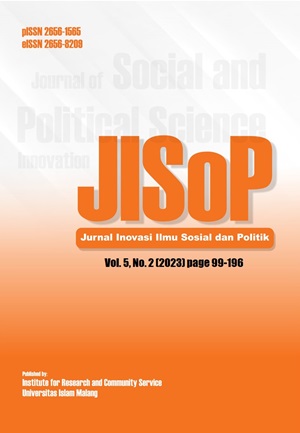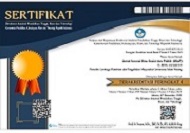The China-US trade dispute in Neo-Realism perspective and settlement of dispute by the WTO
DOI:
https://doi.org/10.33474/jisop.v5i2.20089Keywords:
WTO, US, trade, global tradeAbstract
This study examines the trade dispute between the United States and China from a neo-realist perspective. The relationship between the United States (US) and China became a public concern during the leadership of US President Donald Trump. How could it not be, the two countries were involved in a trade war which ultimately had an impact on the global trade sector in 2019. The method used in this research is qualitative, qualitative provides an in-depth explanation of a phenomenon by collecting related data, highlighting the importance of accuracy and detail in the information provided. studied. The aim of this research is to analyze the trade conflict between China and the US from a neo-realism perspective. This aim can help understand how power can influence. The research results show that the trade war started because Trump did not agree with his country's trade. then linked to neo realism where each country will respond based on its own aspirations for the sake of national interests. Until finally this trade dispute was resolved by the World Trade Organization (WTO). The WTO says the United States has violated global trade rules by imposing tariffs worth billions of dollars in its trade war with China. The WTO decision immediately angered Washington.
References
Adolf, H. (2016). Hukum Penyelesaian Sengketa Internasional. Sinar Grafika.
Adwitama, A. (2022). Peran Maroko Dalam Mempertahankan Wilayah Sahara Barat (Telaah Neo-Realisme: National Interest-Balance of Power). Jurnal Al-Azhar Indonesia Seri Humaniora, 7(3), 173–180. https://doi.org/10.36722/sh.v7i3.1175
CNN Indonesia. (2020, November). Kronologi Perang Dagang AS-China Selama Kepemimpinan Trump. CNN Indonesia.
Dugis, V. (2018). Teori Hubungan Internasional ; Perspektif-Perspektif Klasik (Issue February).
Hasibuan, F. D., Nuraini, A. E., Putra, R. M., Fitriani, A. T. N., & Sudrajat, A. K. (2023). Kebijakan China Paska Perang Dagang, Pandemik Dan Antisipasi Menghadapi Resesi Dunia Tahun 2023. Emerald: Journal of Economics and Social Sciences, 2(1), 25–36. https://jurnalsains.id/index.php/emerald/article/view/46
Moleong, L. J. (2011). Metodelogi Penelitian Kualitatif. Remaja Rosdakarya.
Mufidi, M. F. (2005). Alternatif Penyelesaian Sengketa Menurut Undang- undang no. 30 Tahun 1999 tentang Arbitrase dan Alternatif Penyelesaian Sengketa. Syiar Hukum : Jurnal Ilmu Hukum, 7, 300–317.
Oktaviano, A., & Waluyo, T. J. (2017). Peran World Trade Organization (WTO) dalam menyelesaikan sengketa perdagangan daging sapi Antara Amerika-Indonesia Tahun 2012-2016. Jurnal Online Mahasiswa Fakultas Ilmu Sosial Dan Ilmu Politik Universitas Riau, 4(2), 239–241. https://jom.unri.ac.id/index.php/JOMFSIP/article/view/16281
Permana, R. B. (2023). Penyelesaian Sengketa Dalam Perjanjian Perdagangan Megaregional: Regional Comprehensive Economic Partnership (RCEP) Agreement. Arena Hukum, 16(1), 147–172. https://doi.org/10.21776/ub.arenahukum.2023.01601.8
Pujayanti, A. (2018). Perang Dagang Amerika Serikat – China Dan Implikasinya Bagi Indonesia. Info Singkat: Bidang Hubungan Internasional, X(07/I/Puslit/April/2018), 7–12.
Restiyanda, R. (2020). Penyelesaian Sengketa Dagang Internasional Melalui Mediasi Sebagai Alternatif Penyelesaian Sengketa Pada Pemilihan Hukum Dan Forum Kontrak Dagang Internasional. Aktualita (Jurnal Hukum), 3(1), 130–146. https://doi.org/10.29313/aktualita.v0i0.5689
Rusydiana, A. S. (n.d.). Perdagangan Internasional: Komparasi Konsep Ekonomi Modern dengan Perspektif Islam. 9(1), 1–24.
Sitorus, D. S. (2021). Perang Dagang Amerika Serikat dan Tiongkok: Bagaimana Dampaknya Bagi Perekonomian Indonesia Tahun 2017 - 2020? Jurnal Pendidikan Ekonomi Undiksha, 13(1), 187. https://doi.org/10.23887/jjpe.v13i1.34192
Sugiono. (2010). Metode Penelitian Tindakan Kelas Pendekatan Kuantitatif, Kualitatif, dan R&D. Alfabeta.
Taufani, M. R. I. (2023). Membongkar Perang Dagang AS Vs China & Upaya Dedolarisasi. CNBC Indonesia. https://www.cnbcindonesia.com/research/20230421165302-128-431640/membongkar-perang-dagang-as-vs-china-upaya-dedolarisasi
Tobing, D. hizki, Herdiyanto, Y. K., & Astiti, D. P. (2016). Bahan Ajar Metode Penelitian Kualitatif. Program Studi Psikologi Fakultas Kedokteran Universitas Udaya, 42.
Ukas, U. (2018). Analisis Yuridis Mekanisme Penyelesaian Sengketa Perdagangan Internasional (Dalam Kerangka Gatt-Wto). JCH (Jurnal Cendekia Hukum), 4(1), 129. https://doi.org/10.33760/jch.v4i1.93
Zulkifli, N. (2018). Teori Realisme dan Neo Realisme.pdf. Research Gate, 1(October 2016), 1–25. https://doi.org/10.13140/RG.2.2.30735.48808
Downloads
Published
How to Cite
Issue
Section
License
Copyright (c) 2023 Annisa Nadya Farnillah, Arie Paksi

This work is licensed under a Creative Commons Attribution-ShareAlike 4.0 International License.
.



_-_Copy.jpg)





